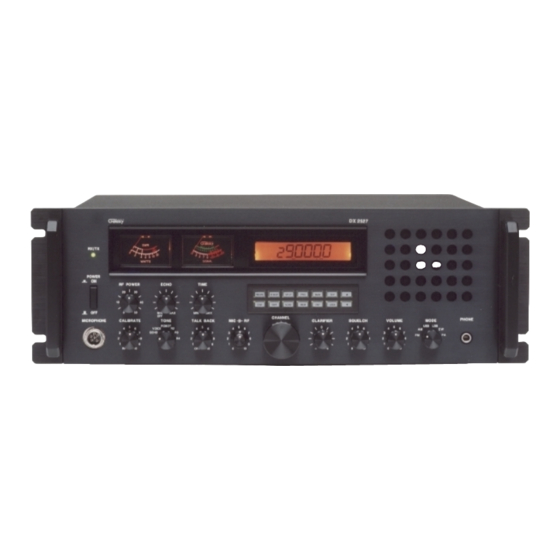Galaxy DX 2527 Manual del usuario - Página 2
Navegue en línea o descargue pdf Manual del usuario para Transceptor Galaxy DX 2527. Galaxy DX 2527 10 páginas. Am/fm/ssb/cw/pa amateur base station transceiver

SPECIFICATION:
GENERAL
Frequency Range
28.0000 – 29.6999 MHz
Emission Types
CW, FM, AM, USB, LSB
Frequency Control
Phase-Lock-Loop Synthesizer
Frequency Tolerance
0.005%
Frequency Stability
0.003%
O
Temperature Range
-30
Antenna Impedance
50 Ohms
Antenna Connectors
Standard SO-239 Type
Meter #1: RF Output Power / Antenna SWR.
Meter Function
Meter #2: Received Signal Strength / MOD%
AC Input Voltage
AC 120V , 60 Hz
TRANSMITTER
RF Power Output
25W: USB, LSB.
Antenna Connectors
UHF Type, 50 Ohms
AM Modulation
Up to 100%
Clarifier Range
±1 KHz
Spurious Emissions
-60dB
Carrier Suppression
-60dB
RECEIVER
Sensitivity for 10dB S/N
AM: 0.5uV
Sensitivity for 20dB S/N
FM : 0.25uV
Sensitivity for 10dB S/N
USB/LSB: 0.3uV
Adjacent Channel Rejection -60dB
Image Rejection Ratio
-50dB
SSB//AM: 80 dB for 50mV
AGC Figure of Merit
for 10 dB Change in Audio Output
Audio Output Power @ 10%
2.5W
THD
(SPECIFICATIONS SUBJECT TO CHANGE WITHOUT NOTICE.)
O
C to +55
C
10W: AM, FM, CW
- 2 -
INSTALLATION:
Location/Connection
The transceiver should be placed in a convenient operating location
close to an AC power outlet and the antenna lead in cable(s).
The transceiver is powered with the AC power cord set. Proceed as
follows to complete all necessary connections to the transceiver.
1. Your transceiver has standard antenna connectors of type SO-239
both located on rear panel; for easy connection to standard PL-
259 coax plugs. If the coax antenna cable must be made longer,
use coax cable with impedance of 50 ohms and use only enough
cable to suit your needs. This will insure a proper impedance
match and maximum power transfer from the transmitter to the
antenna.
2. AC Power Operation: Use 120 volts AC.
Noise Interference
There are several kinds of noise interference you may encounter in
fixed operation. Some of these noise sources are; fluorescent buzz,
nearby commercial broadcast, electrical appliance, lawnmower, and
electrical storms, etc. Commercial products are available to reduce
interference from these sources. Consult your dealer or professional
amateur radio supply shops.
- 3 -
